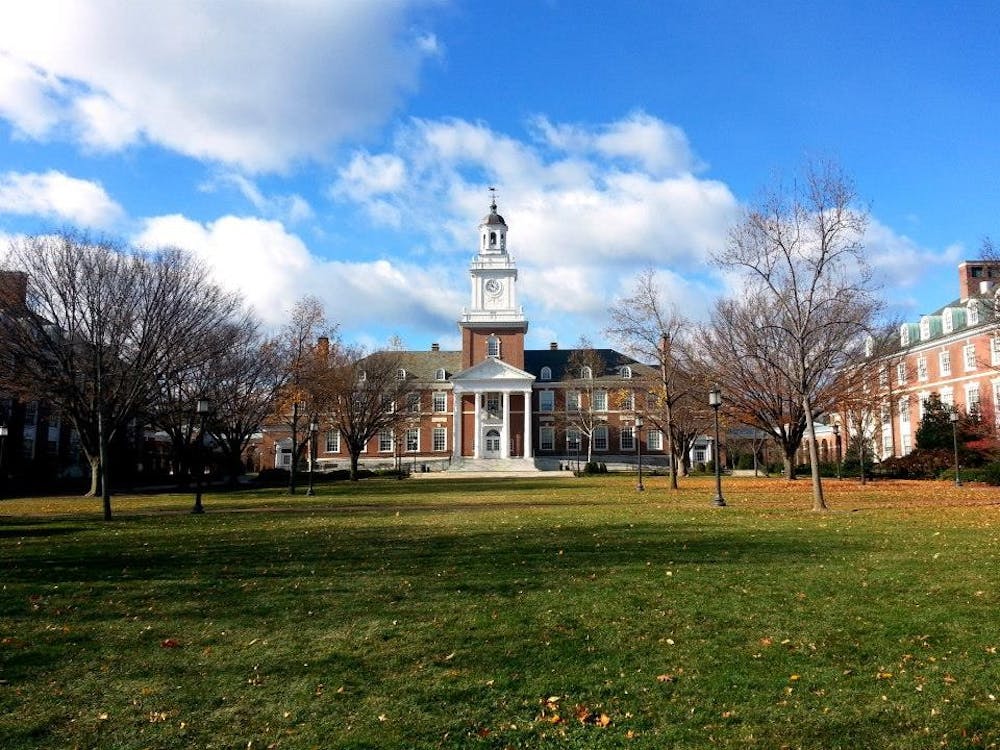Following a six-month-long review of the Humanities Center (HC), Dean of the Krieger School of Arts and Sciences Beverly Wendland announced that the University will not close the department.
This announcement came after a neutral committee headed by Sheridan Dean of University Libraries and Museums Winston Tabb submitted a report that outlined three potential paths forward for the department.
Director of the HC Hent de Vries, along with several graduate students and other faculty who led the fight against the potential closure, released a statement praising the decision. They thanked those who have defended the department over the past months.
But while they appreciated the neutral committee’s efforts, several HC graduate students have also voiced concern and said that the decision should be treated cautiously.
The report includes several suggestions for the future of the HC, three options for moving forward and background on the controversy of the preceding months,
The suggestions include redefining the department’s academic focus so that it does not overlap with other humanities departments, creating an undergraduate major and running the department more transparently and inclusively.
The report recommends that the two vacant faculty lines in the HC should be filled in accordance with the department’s new objectives, which have yet to be determined.
In the report’s first option for moving forward, the HC would retain its current name and pursue the changes described above. The report calls for the creation of a short-term ad hoc committee to help guide those changes.
In the second option, the HC would change its name to better reflect its academic mission of studying comparative literature and intellectual history. The report suggests possible names like the “Humanistic Studies Department” or “Comparative Critical Theories and Societies Department.”
The final option would be to transform the HC into a department that focuses exclusively on the study of comparative literature, which is currently one of the two tracks that graduate students in the Center may pursue.
At the end of the report, the neutral committee admits that implementing these suggestions will be difficult and acknowledges that the uncertainty surrounding the HC’s future in the past months have “demoralized essentially the entire faculty.” The report states that the HC could require another reassessment in the future.
Since the news of possible closure, graduate students have led several demonstrations supporting the Center and accusing the administration of a lack of transparency. The report criticized the graduate students’ actions, stating that they “harmed their own reputations and that of the university.”
Specifically, the report discounted the fears and allegations that humanities as a whole were under attack at the University, calling this understanding to be “misled” and “alarmist.”
The report argued that Wendland has supported the humanities at Hopkins in the past and that the administration holds no vendetta against the humanities.
Omid Mehrgan, a graduate student in the Center, disagreed with this assessment, saying that students had good reason to be worried about the state of the humanities at Hopkins.
“That connection was made in part [between the HC and humanities in general] because as the report itself confesses, there have been cases in Britain and in the US where humanities institutions were abruptly shut down, underfunded, starved,” he said. “The report itself provides a reason for why students should feel concerned and anxious and that other small departments, instutions or centers could be the target of such an assault.”
Michael McCreary, another HC graduate student, explained how it was the language of Wendland’s original memo issued last June, which seemed to threaten the closure of the department, that prompted a sense of urgency and anxiety.
“I’m not sure if the administration fully considered the effects of their language and that possibility on the effect of the graduate student body, because we did take it as an existential threat,” he said. “I was kind of surprised that the administration was surprised that we were organizing after they specifically threatened the closure of our department.”
Looking towards the future, both McCreary and Mehrgan say that there is still worrying uncertainty.
“The language of the report is still ambiguous,” Mehrgan said. “It seems that many things will depend on what will come next. The Dean has yet to decide on what the path forward should be, what is mandatory, what is suggestion, what they mean by certain restructuring. This might still be a bit early to comment.”
McCreary, who just finished his first semester as a PhD student, spoke about his experience arriving at the HC in the midst of this controversy and how he is still wary of the administration’s commitment to the Center.
“I haven’t been fully convinced that the administration is completely supportive of my department because my main interactions with them so far have been trying to justify why the department should exist which is not necessarily something to be the first thing you do upon coming to a place,” he said. “I’m very happy the review process has suggested that we shouldn’t close the department, so that inspires some faith in the administration.”





